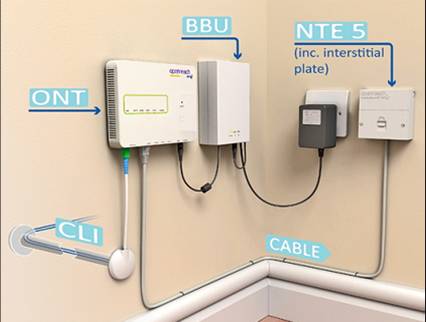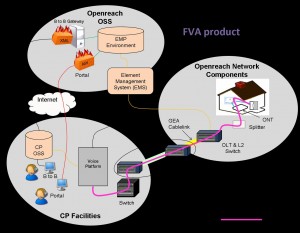BT has killed off VoNGA. Bit of a shame really because I was kinda fonda VoNGA. Voice over Next Generation Access or VoNGA was BT Openreach’s initial stab at voice over fibre and initially at least notionally aimed at new developments where it didn’t make sense to put legacy voice infrastructure into an exchange.
Now BT has strangled VoNGA in the womb. We never really heard it’s first cry.
Don’t get me wrong. It was only the acronym I liked – I thought it sounded good. The product itself, a reduced feature set Plain Old Telephone Service (if such a thing is possible), did not impress, partly because of its total lack of ambition but also its complexity. My biggest concern was that BT would replace such an obviously good acronym with some fancy marketing lingo.
Instead we now have Fibre Voice Access (FVA). Not nearly such a good acronym and though the product is simpler than VONGA I’m not sure that is is anything other than a fibre based POTS service. CPs will now just buy the basic service from Openreach – just like they now rent a copper cable.
The two diagrams below show the kit you would have in your premises and how this notionally connects to the phone network using the Communications Provider’s VoIP platform (both carry the usual Openreach disclaimers about being subject to change).
The one thing that annoys me is that the pricing for this product looks just like that Openreach charges for a copper line and that is despite the fact that fibre should not cost anything near as much to operate. I guess if I was the operator with Significant Market Power I’d be looking to squeeze as much out of the punters as I could get.
Moreover it remains to be seen what value users will get for this money. In my mind there should be nothing to stop CPs selling voice over broadband services to people without the involvement of Openreach as long as the basic Fibre To The Premises capability is there.
The Openreach pitch is that this product provides PATS (Publicly Accessible Telephone System) compatibility, a legal requirement. However most ITSPA members will attest to already being PATS compliant.
Before getting too animated here we should remind ourselves that this is in anycase a long term play for Openreach. Based on the FTTP planned footprint, which will be available to 25% of people in Fibre To The Cabinet (FTTC) areas. This means that by Summer of 2012 there will be roughly 2.5m premises that might be able to get FVA rising to roughly 66% of all UK premises by 2015 (15 millions or so premises).
Not exactly numbers to excite. Even the acronym is boring. I think the UK’s stable of Alternate Operators will have to take the lead here in providing VoIP over broadband based services that offer 21st century features. Openreach does claim to have interested CP partners.

The BBU in the picture is Battery Backup Unit which is likely to cause problems – who changes the battery when it no longer works? The Communications Provider? If the CP choses not to do this does this mean they are liable in the event of non-functioning of the telephone if there is a power cut – an analogue telephone takes its power off the copper line – this is not the case for fibre. Openreach is, I believe still in discussions re the best approach here.
This product is initially only being considered for brownfield sites. Greenfield sites will also be available for voice only as BT is obliged to provide a service under their Universal Service Obligation. It is expensive though. Also FTTC is not in the frame initially.


4 replies on “VONGA is dead – long live FVA? – Openreach”
if you have a fibre connection you don’t need a phone connection, plenty of businesses will provide you with one at a fraction of the cost the copper cabal charge… bet openreach are panic stricken… great stuff.
cd – maybe you don’t understand the significance of needing a working phone when the power goes off.
Why would Openreach panic? They have developed a solution to provide phone and broadband over fibre.
Maybe it’s the phone service providers that are panicing, like the Post Office and Talktalk.
To be honest I think that the feeling that a battery back up is needed is being overcautious although I understand the need in an increasingly litigious world. It potentially adds complexity to the ongoing service model that is not necessarily required. For example many people today only use a DECT phone which does not work if there is a power cut.
There is an unanswered question with pure fiber (I’m from across the pond) deployments. How do you deal with power failures and line breaks ?
I’m not comfortable with fiber-only cabling for my landline. A hybrid cable with a copper pair offers valuable redundancy at minimal extra cost. That copper pair doesn’t have to be a single-user circuit – it could be an updated version of the party line. The premises end would have a “Service Request” button and an intercom module. The street box would have a remote controlled switching pod that would handle the link between the premises and a call center. This would be similar to the lifeline services offered by some burglar alarm companies (“I’ve fallen and can’t get up …”). The only problem the copper pair / intercom can’t handle is some navvy with a backhoe.
The problem with battery backups is that they are limited in lifespan and duration. They are only good for a few years of service before requiring replacement. And a battery failure can have substantial consequences (see link below). Plus, the battery may only provide service for a few hours to a day tops. And those units rarely, if ever, have a connection for an expansion module for when there is an extended power failure and NO MOTOR GENERATOR (noisy, smelly beasts !). I’ve been through a day long power outage in the last couple of years and my POTS phone was of great comfort. And my house is urban – not rural – and only about one or two miles from a major sub-station.
http://www.infoworld.com/t/network-monitoring-and-management/your-data-center-lying-you-997